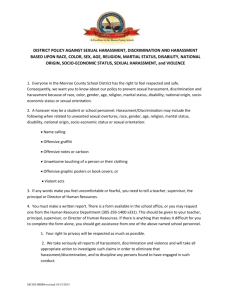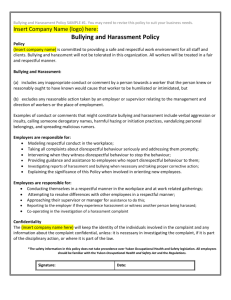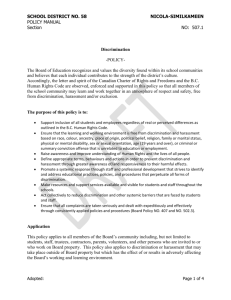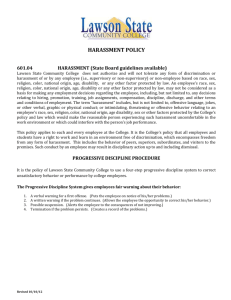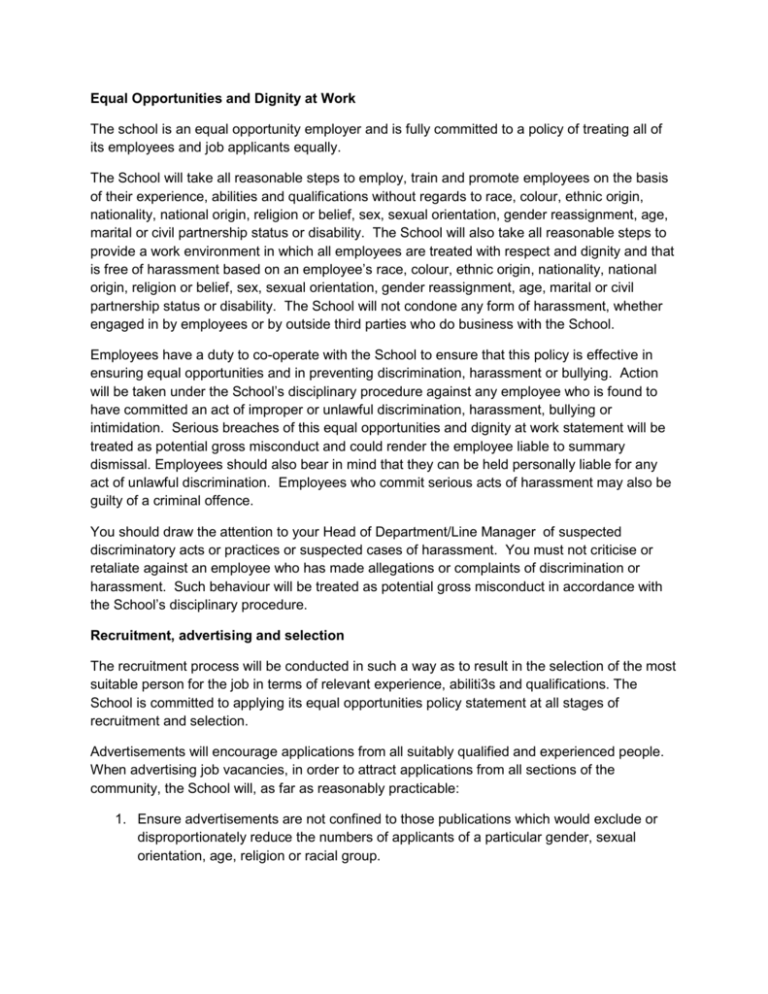
Equal Opportunities and Dignity at Work
The school is an equal opportunity employer and is fully committed to a policy of treating all of
its employees and job applicants equally.
The School will take all reasonable steps to employ, train and promote employees on the basis
of their experience, abilities and qualifications without regards to race, colour, ethnic origin,
nationality, national origin, religion or belief, sex, sexual orientation, gender reassignment, age,
marital or civil partnership status or disability. The School will also take all reasonable steps to
provide a work environment in which all employees are treated with respect and dignity and that
is free of harassment based on an employee’s race, colour, ethnic origin, nationality, national
origin, religion or belief, sex, sexual orientation, gender reassignment, age, marital or civil
partnership status or disability. The School will not condone any form of harassment, whether
engaged in by employees or by outside third parties who do business with the School.
Employees have a duty to co-operate with the School to ensure that this policy is effective in
ensuring equal opportunities and in preventing discrimination, harassment or bullying. Action
will be taken under the School’s disciplinary procedure against any employee who is found to
have committed an act of improper or unlawful discrimination, harassment, bullying or
intimidation. Serious breaches of this equal opportunities and dignity at work statement will be
treated as potential gross misconduct and could render the employee liable to summary
dismissal. Employees should also bear in mind that they can be held personally liable for any
act of unlawful discrimination. Employees who commit serious acts of harassment may also be
guilty of a criminal offence.
You should draw the attention to your Head of Department/Line Manager of suspected
discriminatory acts or practices or suspected cases of harassment. You must not criticise or
retaliate against an employee who has made allegations or complaints of discrimination or
harassment. Such behaviour will be treated as potential gross misconduct in accordance with
the School’s disciplinary procedure.
Recruitment, advertising and selection
The recruitment process will be conducted in such a way as to result in the selection of the most
suitable person for the job in terms of relevant experience, abiliti3s and qualifications. The
School is committed to applying its equal opportunities policy statement at all stages of
recruitment and selection.
Advertisements will encourage applications from all suitably qualified and experienced people.
When advertising job vacancies, in order to attract applications from all sections of the
community, the School will, as far as reasonably practicable:
1. Ensure advertisements are not confined to those publications which would exclude or
disproportionately reduce the numbers of applicants of a particular gender, sexual
orientation, age, religion or racial group.
2. Avoid prescribing any unnecessary requirements which would exclude a higher
proportion of a particular gender, sexual orientation, age, religion or racial group or
which would exclude disabled job applicants.
3. Avoid prescribing any requirements as to marital or civil partnership status.
4. Where vacancies may be filled by promotion or transfer, they will be published to all
eligible employees in such a way that they do not restrict applications from employees of
any particular gender, sexual orientations, age, religion or racial group or which would
exclude disabled job applicants.
5. Avoid prescribing any requirements as to marital or civil partnership status.
6. Where vacancies may be filled by promotion or transfer, they will be published to all
eligible employees in such a way that they do not restrict applications from employees of
any particular gender, sexual orientation, age, religion group or from employees with a
disability.
The selection process will be carried out consistently for all jobs at all levels. All applications will
be processed in the same way. The staff responsible for short-listing, interviewing and selecting
candidates will be clearly informed of the selection criteria and of the need for their consistent
application. Person specifications and job descriptions will be limited to those requirements that
are necessary for the effective performance of the job. Whenever possible, all applicants will be
interviewed by at least two interviewers and all questions asked of the applicants will relate to
the requirements of the job. The selection of new staff will be based on the job requirements
and the individual’s suitability and ability to do, or to train for, the job in question.
With disabled job applicants, the School will have regard to its duty to make reasonable
adjustments to work provisions, criteria and practices or to work premises in order to ensure that
the disabled person is not placed at a substantial disadvantage in comparison with persons who
are not disabled.
It is necessary to assess whether personal circumstances will affect the performance of the job
(for example, if the job involves unsociable hours or extensive travel), this will be discussed
objectively, without detailed questions based on assumptions about race, colour, ethnic origin,
nationality, national origin, religion or belief, sex, sexual orientation, gender reassignment, age,
marital or civil partnership status disability, children and/or domestic obligations.
Training and promotion
The School will train all Heads of Department/Line Managers in the School’s policy on equal
opportunities and in helping them identify discriminatory acts or practices or acts of harassment
or bullying. Heads of Department/Line Managers will be responsible for ensuring they actively
promote equal opportunity within the departments for which they are responsible.
The School will also provide training to all employees to help them understand their rights and
responsibilities in relation to diginity at work and what they can do to create a work environment
that is free of bullying and harassment.
Where a promotional system is in operation, it will not be discriminatory and it will be checked
from time to time to assess how it is working in practice. When a group of workers
predominantly of one race, religion, sex, sexual orientation or age group or worker with a
disability appears to be excluded from access to promotion, transfer and training and to other
benefits, the promotional system will be received to ensure there is no unlawful discrimination.
Terms of employment, benefits, facilities and services
All terms of employment, benefits, facilities and services will be received from time to time, in
order to ensure that there is no unlawful discrimination on the grounds of race, colour, ethnic
origin, nationality, national origin, religion or belief, sex, sexual orientation, gender
reassignment, age, marital or civil partnership status or disability.
Equal pay.
The School is committed to equal pay in employment. It believes its male and female
employees should receive equal pay for like work, work rated as equivalent or work of equal
value. In order to achieve this, the Scholl will endeavour to maintain a pay system that is
transparent, free from bias and based on objective criteria.
Bullying and harassment
Bullying is offensive ot intimidating behaviour or an abuse or misuse of power which undermines
or humiliates an employee.
Harassment occurs where, on the ground if an employee’s race, colour, ethnic origin,
nationality, national origin, religion or belief, sex, sexual orientation, gender reassignment, age,
marital or civil partnership status or disability, a person engages in unwanted conduct that:
Has the purpose of violating the employee’s dignity at work, or of creating an intimidating
hostile degrading, humiliating or offensive work environment for the employee or:
Is reasonably considered by the employee to have the effect of violating his or her
dignity at work, or of creating an intimidating, hostile, degrading, humiliating or offensive
work environment for the employee, even if this effect was not intended by the person
responsible for the conduct.
Conduct may be harassment whether or not the person intended to offend. Something intended
as a ‘joke’ or as ‘office banter; may offend another person. This is because different employees
find different levels of behaviour acceptable and everyone has the right to decide for themselves
what behaviour they find acceptable to them.
Behaviour which a reasonable person would realise would be likely to offend an employee will
always constitute harassment without the need for the employee having to make it clear that
such behaviour is unacceptable, for example, touching someone in a sexual way. With other
forms of behaviour, it may not always be clear in advance that it will offend a particular
employee, for example, office banter and jokes. In these cases, the behaviour will constitute
harassment if the conduct constitutes after the employee has made it clear, by words or conduct
that such behaviour is unacceptable to him or her. A single incident can amount to harassment
if it is sufficiently serious.
Harassment also occurs where, on the ground of the employee’s rejection of or submission to
unwanted conduct of the kind specified above, a person treats the employee less favourably
than he or she would treat him or her had he or she not rejected, or submitted to , the unwanted
conduct.
Examples
Bullying and harassment may be verbal, non-verbal, written or physical. Examples of
unacceptable behaviour include, but are not limited to, the following:
Unwelcome sexual advances, requests for sexual favours, other conduct of a sexual
nature.
Subjection to obscene or other sexually suggestive or racist comments or gestures.
The offer of rewards for going along with sexual advances or threats for rejecting sexual
advances.
Jokes or pictures of a sexual or racial nature.
Demeaning comments about an employee’s appearance.
Questions about a person’s sex life.
The use of nick names related to an employee’s sex, sexual orientation, gender
reassignment, race, religion, age or disability.
Picking on or ridiculing an employee.
Isolating an employee or excluding him or her from social activities or relevant work
related matters.
Reporting complaints
All allegations of discrimination or harassment will be dealt with seriously, confidentially and
speedily. The School will not ignore or treat lightly grievances or complaints of discrimination or
harassment from members of a particular race, colour, ethnic origin, nationality, national origin,
religion or belief, sex, sexual orientation or age or from employees who have undergone gender
reassignment, are married, have entered into civil partnership or have a disability.
With cases of harassment, while the School encourages employees who believe they are being
harassed to notify the offender (by words or by conduct) that his or her behaviour is unwelcome,
the School also recognises that actual or perceived power and status disparities may make
such confrontation impractical.
If you wish to make a complaint of discrimination or harassment, you should follow the following
steps:
1. First of all, report the incident of discrimination or harassment to your Head of
Department/Line Manager. If you complaint relates to your Head of Department/Line
Manager, you can report the matter to an alternative manager or Bursar.
2. Such reports should be made promptly so that investigation may proceed and any action
taken expeditiously.
3. All allegations of discrimination or harassment will be taken seriously. The allegation will
be promptly investigated and, as part of the investigatory process, you will be
interviewed and asked to provide a written witness statement setting out the details of
your complaint. Confidentiality will be maintained during the investigatory process to the
extent that this is practical and appropriate in the circumstances. However, in order to
effectively investigate an allegation, the School must be able to determine the scope of
the investigation and the individuals who should be informed of or interviewed about the
allegation. For example, the identity of the complainant and the nature of the allegations
must be revealed to the alleged harasser or discriminator so that he or she is able to
fairly respond to the allegations. The School reserves the right to arrange for another
manager to conduct the investigation other than the manager with whom you raised the
matter.
4. The School will also invite you to attend at least one meeting at a reasonable time and
place at which your complaint can be discussed. You must take all reasonable steps to
attend that meeting an you have the right to be accompanied at it by either a trade union
official or a fellow employee of your choice.
5. Once the investigation has been completed and after the meeting with you has taken
place, you will be informed in writing of the outcome and the School’s conclusions and
decision as soon as possible. You will also be notified in writing of your right to appeal
against the School’s decision if you are not satisfied with it. The School is committed to
taking appropriate action with respect to all complaints of discrimination or harassment
which are upheld.
6. If you wish to appeal against the School’s decision, you must appeal in writing to the
Bursar within five working days of the School’s decision. On receipt of an appeal, the
Bursar shall make arrangements to hear it at an appeal meeting and at that meeting you
may again, if you wish, be accompanied by either a trade union official or a fellow
employee of your choice. You must take all reasonable steps to attend that meeting.
Following the meeting the Bursar will inform you in writing of the School’s final decision
on you appeal.
7. You will not be penalised for raising a complaint, event if it is not upheld, unless your
complaint was both untrue and made in bad faith.
8. If your complaint is upheld the harasser or discriminator remains in the School’s
employment, the School will take all reasonable steps to ensure that you do not have to
continue working alongside him or her if you do not wish to do so. The School will
discuss the options with you
9. If your complaint is not upheld, arrangements will be made for you and the alleged
harasser or discriminator to continue or resume working and to repair working
relationships.
Alternatively, you may, if you wish, use the School’s grievance procedure to make a
complaint.
Any employee who is found to have discriminated against or harassed another employee in
violation of this policy will be subject to disciplinary action under the School’s disciplinary
procedure. They may also be found to be personally liable to their victim and be ordered to
pay compensation. Such behaviour may be treated as gross misconduct and could render
the employee liable to summary dismissal. In addition, Head of Department/Line Managers
who had knowledge that such discrimination or harassment had occurred in their
departments but who had taken no action to eliminate it will also be subject to disciplinary
action under the School’s disciplinary procedure.
Monitoring equal opportunity and dignity at work
The School will regularly monitor the effects of selection decisions and personnel and pay
practices and procedures in order to assess whether equal opportunity and dignity at work
are being achieved. This will also involve considering any possible indirectly discriminatory
effects of its working practices. If changes are required, the School will implement them.
The School will also make reasonable adjustments to its standard working practices to
overcome barriers caused by disability.


